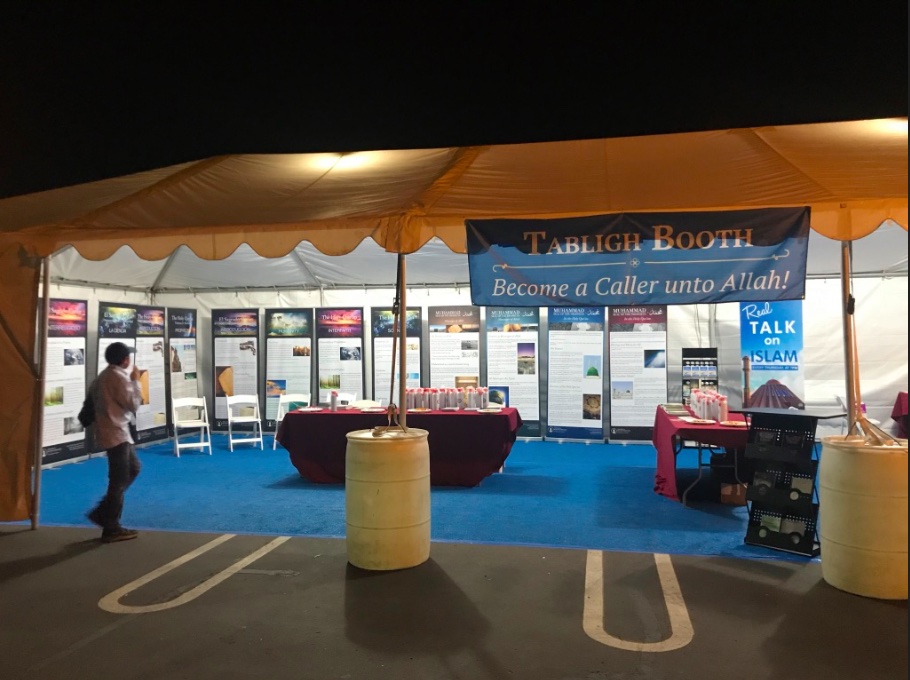
“Today it is the distinction of an Ahmadi that he strives for piety with humility and meekness and does not hesitate to lay down his life for it. They are the people who have been promised mercy and blessings from their Lord. No matter what people say to us, we know that Allah is with us and we are witnessing His blessings being showered upon us on account of our sabr.” This passage is from a letter written to the head of the Ahmadiyya Muslim Community’s Pakistani congregation. The Ahmadiyya originated in India during the British colonial period in the 1880s. The community self-identifies as Muslim, but this identity claim has been challenged by many South Asian and global Muslim leaders since its inception. In Pakistan, in particular, Ahmadis are legally designated as non-Muslims and are subjected to draconian blasphemy laws. The passage from the letter above, describing how Ahmadis ought to persevere through hardship, encapsulates how this community opposes its persecution and marginalization.
Sabr is often translated into English as “patience.” However, as Saba Mahmood notes in her discussion the practice of sabr among women in Egypt’s piety movements in Politics of Piety: “sabr communicates a sense not quite captured by [patience]: one of perseverance, endurance of hardship without complaint, and steadfastness” (171, fn. 15). Sabr is an active form of embodied agency, and in this piece, I present: (1) the role of sabr in the Ahmadiyya ethical program, and (2) how Ahmadiyya’s externalized practices of sabr seek a type of transformation not included in Mahmood’s theorization of agency. Her approach misses important opportunities to interrogate how religious actors—especially those who are minoritized and excluded from public religious discourses—may express their agency in “oppositional” ways that hold religious and secular forms of agency as mutually constitutive. I argue that the Ahmadiyya practice of sabr is at the core of an “oppositional” intentionality not captured by “resistance” or “conformity.”
Despite global persecution and marginalization, the Ahmadiyya has grown in size and global influence through its practices of tabligh [missionary and humanitarian work] and “jihad by the pen” [versus “jihad by the sword”]. Unlike other marginalized Muslims groups, such as the Druze, who do not engage in proselytization, the Ahmadis commit themselves to spreading the “True Islam” through preaching and the written word. Unlike the Baha’i, who splintered from their Muslim origins, the Ahmadis claim themselves as not only part of Islam, but as practitioners of the “True Islam.” Ahmadis participate in discourses that construct and negotiate an Islamic ontology—who is and is not a Muslim—in which the community opposes how “Other Muslims” cast Ahmadis as apostates, and elevates its own interpretation of Islam.
“Preaching with love” is the Ahmadiyya embodiment of sabr. The community’s “Ask an Imam” sessions are live-streamed on social media (available on YouTube, Facebook, Twitter) several times a week, and missionaries will answer questions asked by audience members about Ahmadiyya interpretations of Islam. Sometimes, the missionary will dedicate the beginning segment to a message based on frequently asked questions by the audience or general teachings. On June 29, 2021, the missionary dedicated the first ten minutes to the message of “Preaching with Love and Not Hate.” This was in response to hostility that missionaries face when preaching as Ahmadis, especially online. Throughout the segment, this missionary encouraged Ahmadis to “respond in an academic and an appropriate [manner], even in a strong [approach], but never crossing the limits or behaving in a way that is similar to the way the other party is behaving…when we preach, we should preach with love and with concern…”
The inclination to look for moments of resistance is widespread in modern and postmodern discourses on agency, spanning from liberal discourses, rooted in Rawlsian understandings of the autonomous and rational self, to postmodern discourses, from Michel Foucault to Judith Butler’s theorization of agency through subject formation.
The core of Ahmadiyya intentionality, their practice of sabr, exemplifies the tension between “resistance” and “conformity.” The Ahmadiyya embodiment of sabr has an internalized form, which is more akin to a “conformist” conceptualization of agency, in which the individual is persevering through her circumstances. While internalized sabr is an active form of agency, this is distinct from externalized sabr, in which one perseveres through hardship while also seeking a transformation of circumstances. In the “Ask an Imam” session mentioned above, for example, the internalized form of sabr (when practicing tabligh) is to not behave in a way that mirrors the other party’s hostility, while the externalized form of sabr is to continue preaching with love despite hardship. This externalized form in particular, I argue, takes on “oppositional” forms that are also not recognizable within secular and liberal notions of “resistance.” Because of the emphasis on the practice of sabr, the Ahmadiyya’s continued commitment to spreading “True Islam” rests somewhere between resistance and conformity.
It may be tempting for scholars trained in secular approaches to religious ethics to treat Ahmadiyya agency as a form of resistance. Saba Mahmood argues that liberal feminist assumptions about agency often lead scholars to “look for expressions and moments of resistance that may suggest a challenge to male domination” (8, emphasis my own). The inclination to look for moments of resistance is widespread in modern and postmodern discourses on agency, spanning from liberal discourses, rooted in Rawlsian understandings of the autonomous and rational self, to postmodern discourses, from Michel Foucault to Judith Butler’s theorization of agency through subject formation. Furthermore, agency that seeks transformation has often been referred to as “resistance,” especially among decolonial scholars, while postcolonial approaches to resistance are explicitly premised on secularized assumptions about opposition, in which minoritized actors seek to disrupt the power held by superordinate and repressive structures or actors. However, these secularized understandings of “resistance” misrepresent why the Ahmadiyya claim to worship God as Muslims. As an allegedly apostate group, the Ahmadiyya religious ethic evokes a relationship with Allah that “Other Muslims” might claim this community does not possess. When the Ahmadiyya evokes its relationship to Allah, especially in claiming itself as the “True Islam,” the community is engaging in a form of “opposition” through sabr.

The Ahmadiyya practice of sabr cannot be explained through resistance when taking the community’s ethical intentionality into account. Scholars can observe that yes, the community is using a form of “oppositional” language to communicate its self-proclaimed identity as the “True Islam,” but adherents do not interpret this as resistance. The transformation that the Ahmadiyya seek in this world is not to resist mainstream Muslims who delegitimize the Ahmadiyya Muslim identity or liberal colonial powers; instead, it is a divinely-ordained purpose in this life. It is a purpose in which an Ahmadi “preach[es] with love and with concern…” and “strives for piety with humility and meekness and does not hesitate to lay down his life for it.” It is a duty to God that requires the practice of sabr. Reducing this enactment of agency and sabr to resistance or conformity misses the ethical intentionality that holds both as mutually constitutive.
In her account of piety and embodied agency, Mahmood does not include externalized processes of transformation for the women participating in Egypt’s piety movements. Her account of sabr focused on the dichotomous responses by two Egyptian women—one who identifies as “secular Muslim” and another who participates in the piety movements—to the patriarchal pressures put onto single women in Egypt. While the former focused on the “practice of self-esteem” to survive such oppressive social conditions, the latter emphasized sabr. Mahmood cautions her readers from casting sabr as passive. She argues against secular and liberal sensibilities of agency that might see in this virtue a reluctance to actively engage with the situation in which one finds herself. In fact, sabr entails an “individual responsibility that is bounded by both an eschatological structure and a social one” (173). The individual responsibility to persevere and endure is bounded by a duty to God, which will come with eternal blessings, and an acknowledgment that each individual is responsible for her own actions—God is just and everyone will be responsible for their own deeds.
Mahmood’s conceptualization of embodied agency is unable to account for the moments of transformation that religious actors seek in this world, while being committed to a higher eschatological goal. Her conceptualization reinforces binaries of ‘resistance’ or ‘conformity.’
As she is concluding her discussion of sabr as a form of embodied agency, Mahmood argues that “[n]either [woman], for a variety of reasons, could pursue the project of reforming the oppressive situation they were forced to inhabit” (174). Such sociopolitical conditions yielded a form of “conformist” agency—one that is active in nature and has the goal of survival rather than transformation. While she uncovers the “grammar of concepts” within the communities’ own discourses, Mahmood’s commitment to this “positive conception of ethics” narrows the possibilities of ethical action for religious actors, including, possibly, her own interlocutors.
In trying to preserve “a purist interpretation” of conformist religious discourse, as Atalia Omer has argued, Mahmood misses opportunities to consider how religious actors are participating in and shaping modern discourses. Mahmood claims that “[n]either [woman]…could pursue the project of reforming the oppressive situation they were forced to inhabit” (174)—is this necessarily true? Can we think of the women participating in the piety movements as transforming the liberal, colonial, and secular structures within the modern nation-state through sabr? The piety movements exemplified externalized forms of sabr, by advocating to preserve particular values allegedly contradictory to the modern nation-state. The women were participating in and transforming discourses on Islam and modernity through their preservation of piety and acts of sabr. While Mahmood has made substantial contributions to accounts of religious agency in her work, I find that it just falls short due to her own resistance against liberal feminist scholars who “look for expressions and moments of resistance that may suggest a challenge to male domination.” Mahmood’s conceptualization of embodied agency is unable to account for the moments of transformation that religious actors seek in this world, while being committed to a higher eschatological goal. Her conceptualization reinforces binaries of “resistance” or “conformity.” The Ahmadiyya’s ethical program embodies sabr in both the internalized form that Mahmood conceptualizes, but also an externalized one that seeks an “oppositional” transformation.
The claim that the Ahmadiyya embodies the “True Islam,” and that this message must be spread globally, encapsulates what I argue is an “oppositional” form of agency—one that is beyond the binary framework of “resistance” or “conformity.” The recasting of mainstream forms of Muslim identity, or Islamic ontology, is not represented through secular forms of “resistance” when considering the religious ethics undergirding the opposition itself. A duty to God, which calls for Ahmadis to continue advocating for the “True Islam” through “jihad by the pen” and sabr, is the source of Ahmadiyya religious ethics and ethical intentionality. And this practice of sabr is, like Mahmood noted, an active state of perseverance. This practice of sabr is also, unlike Mahmood’s conceptualization, an externalized embodiment to transform this world by continuing to spread the “True Islam.” Therefore, the “oppositional” agency of the Ahmadiyya is more complex than the previous theories of agency—from both Mahmood and those whom she critiques—are able to account for because it simultaneously holds together the ephemeral and temporary nature of this life, while also emphasizing the importance of transforming it. And this work continues for the Ahmadiyya, regardless of worldly consequences. As one Ahmadi leader said to me: we’ve become “oblivious to the fact that someone is trying to harm us…[because] they can only do so much…[the] worst they can do is harm you and send you to Paradise earlier than you would have wanted to go yourself” (interview, March 2021).

